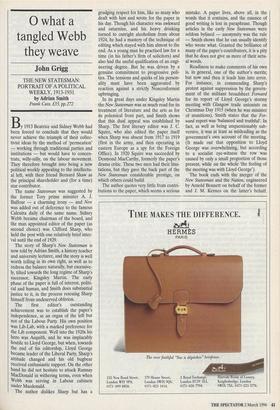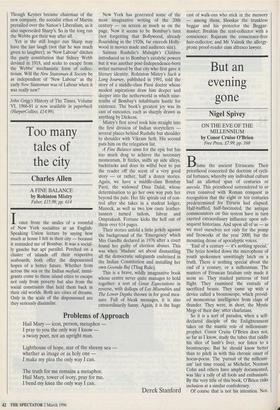0 what a tangled Webb they weave
John Grigg
THE NEW STATESMAN: PORTRAIT OF A POLITICAL WEEKLY, 1913-1931 by Adrian Smith Frank Cass, £35, pp.272 By 1913 Beatrice and Sidney Webb had been forced to conclude that they would never achieve the triumph of their collec- tivist ideas by the method of 'permeation' — working through traditional parties and institutions — but would have to concen- trate, willy-nilly, on the labour movement. They therefore brought into being a new political weekly appealing to the intellectu- al left, with their friend Bernard Shaw as the principal shareholder and (for a time) star contributor.
The name Statesman was suggested by the former Tory prime minister A. J. Balfour — a charming irony — and New was added out of deference to the famous Calcutta daily of the same name. Sidney Webb became chairman of the board, and the man appointed editor of the paper (as second choice) was Clifford Sharp, who held the post with one relatively brief inter- val until the end of 1929.
The story of Sharp's New Statesman is now told by Adrian Smith, a history teacher and university lecturer, and the story is well worth telling in its own right, as well as to redress the balance naturally, but excessive- ly, tilted towards the long regime of Sharp's successor, Kingsley Martin. The early phase of the paper is full of interest, politi- cal and human, and Smith does substantial justice to it, in the process rescuing Sharp himself from undeserved oblivion.
The first editor's outstanding achievement was to establish the paper's independence, as an organ of the left but not of the Labour Party. His own position was Lib-Lab, with a marked preference for the Lib component. Well into the 1920s his hero was Asquith, and he was implacably hostile to Lloyd George, but when, towards the end of his editorship, Lloyd George became leader of the Liberal Party, Sharp's attitude changed and his old bugbear received enthusiastic support. On the other hand he did not hesitate to attack Ramsay MacDonald in withering terms, even when Webb was serving in Labour cabinets under Macdonald.
The author dislikes Sharp but has a grudging respect for him, like so many who dealt with him and wrote for the paper in his day. Though his character was awkward and saturnine, and his heavy drinking turned to outright alcoholism from about 1924, he had a mastery of the technique of editing which stayed with him almost to the end. As a young man he practised law for a time (in his father's firm of solicitors) and also had the useful qualification of an engi- neering degree. But he was driven by a genuine commitment to progressive poli- tics. The tensions and quirks of his person- ality must have been aggravated by reaction against a strictly Nonconformist upbringing.
In its great days under Kingsley Martin the New Statesman was as much read for its treatment of literature and the arts as for its polemical front part, and Smith shows that this dual appeal was established by Sharp. The first literary editor was J. C. Squire, who also edited the paper itself when Sharp was absent from 1917 to 1919 (first in the army, and then operating in eastern Europe as a spy for the Foreign Office). In 1920 Squire was succeeded by Desmond MacCarthy, formerly the paper's drama critic. These two men had their limi- tations, but they gave the back part of the New Statesman considerable prestige, on which others could build.
The author quotes very little from contri- butions to the paper, which seems a serious mistake. A paper lives, above all, in the words that it contains, and the essence of good writing is lost in paraphrase. Though articles in the early New Statesman were seldom bylined — anonymity was the rule — Smith shows that he can usually identify who wrote what. Granted the brilliance of many of the paper's contributors, it is a pity that he does not give us more of their actu- al words.
Readiness to make comments of his own is, in general, one of the author's merits; but now and then it leads him into error. For instance, in commending Sharp's protest against suppression by the govern- ment of the militant broadsheet Forward for its report of Lloyd George's stormy meeting with Glasgow trade unionists on Christmas Day 1915 (when he was minister of munitions), Smith states that the For- ward report was 'balanced and truthful'. In fact, as well as being unquestionably sub- versive, it was at least as misleading as the government's own account of the meeting. (It made out that opposition to Lloyd George was overwhelming, but according to a socialist eye-witness the row was caused by only a small proportion of those present, while on the whole 'the feeling of the meeting was with Lloyd George').
The book ends with the merger of the New Statesman and the Nation, engineered by Arnold Bennett on behalf of the former and J. M. Keynes on the latter's behalf. Though Keynes became chairman of the new company, the socialist ethos of Martin prevailed over the Nation's Liberalism, as it also superseded Sharp's. So in the long run the Webbs got their way after all.
Yet in the still longer run Sharp may have the last laugh (not that he was much given to laughter), as 'New Labour' ditches the party constitution that Sidney Webb devised in 1918, and seeks to escape from the Webbs' mechanistic form of collec- tivism. Will the New Statesman & Society be as independent of 'New Labour' as the early New Statesman was of Labour when it was really new?
John Grigg's History of The Times, Volume VI, 1966-81 is now available in paperback (HarperCollins, £14.99).



































































 Previous page
Previous page